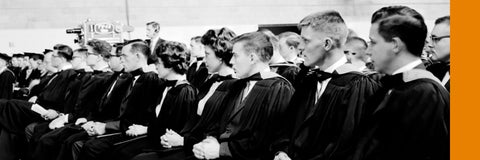
Different from the start
The University of Waterloo was founded in 1957 (the University of Waterloo Act received royal assent on 5 March 1959). At that time, its immediate goal was to address Canadian society’s need to educate more professional engineers, and to do so in a pioneering fashion: the 74 engineering students in its inaugural class were to pursue their schooling through a co-operative system of education. But the founders of Waterloo had a larger long-term vision as well: a new university with the breadth and depth that would allow it to take its place alongside Canada’s older institutions, while at the same time maintaining its unique spirit of connectedness between academia and the world beyond. Waterloo was not to be an ivory tower. Its singularity was to be its focus on experiential learning, in which students benefitted from regular relevant employment experiences outside the academy, and faculty and students alike brought a problem-solving mentality and a goal of real-world impact to the academic mission of the institution.
A Faculty of Arts was already in the minds of the University’s founders when it opened its doors to those engineering students in 1957. This was particularly so of Gerald Hagey, who became Waterloo’s President in 1958: “The humanities call now – as always – for the attention of all who work towards a fuller Canadian life.”[1] Postsecondary courses in the arts had been taught in the local institutions that had preceded the founding of the new university: Waterloo College and St. Jerome’s College, each of which had a lengthy and lively history of its own that entwined it with the institution. But in 1960, with the hiring of more than 20 professors in such diverse areas as history, English, mathematics, German, Russian, French, Spanish, and political science, the Faculty of Arts at the University of Waterloo was born. Within the next two to three years, courses of study also became available in geography, economics, philosophy, classics, and psychology. Collaboration with St. Jerome’s, together with the nascent Renison, Conrad Grebel, and St. Paul’s (now United), amplified Arts’ offerings further through partnerships that continue today.
Since 1960, the Faculty of Arts at Waterloo has gone through many changes. It has grown considerably in size, with a fully rounded representation of humanities, social sciences, languages, and creative arts. It has moreover kept pace with the unconventional differentiators that distinguish Waterloo. Arts was a leader in the University’s distance education initiative, which took its place alongside co-op as one of those differentiators. Co-operative education was first introduced into Arts in 1975 in the Department of Economics; not long after, co-op became available to any Arts majors through the Applied Studies (now Arts and Business) program. As of 2022, more than 60% of all Arts students are in co-op. Other business-related programming has also flourished, in the School of Accounting and Finance and the Stratford School of Interaction Design and Business.
Over the decades, the Faculty has experienced dramatic shifts in student needs, desires, and expectations, and its research profile has expanded in multiple award-winning directions unforeseen by those early founders. At this point in time, Arts has well over 300 faculty members, 140 staff, almost 8,000 undergraduate students, and over 750 graduate students. Arts convocations celebrate close to 2,000 graduates every year, from over 60 distinct programs. Neither the Faculty nor the University has stood still since its inception: as the University strategic plan asserts, “Waterloo is built for change.” With change comes the need for regular self-assessment and strategic planning for the Faculty’s future. Regardless of the existing strengths of Waterloo’s Arts scholars, educators, and students, the Faculty needs to remain receptive to reform and renewal in order to maintain its place as part of “an evolving institution in an evolving world” (Waterloo @ 100).
[1] Quoted in K. McLaughlin, Waterloo: the Unconventional Founding of an Unconventional University, University of Waterloo 1997, 89.